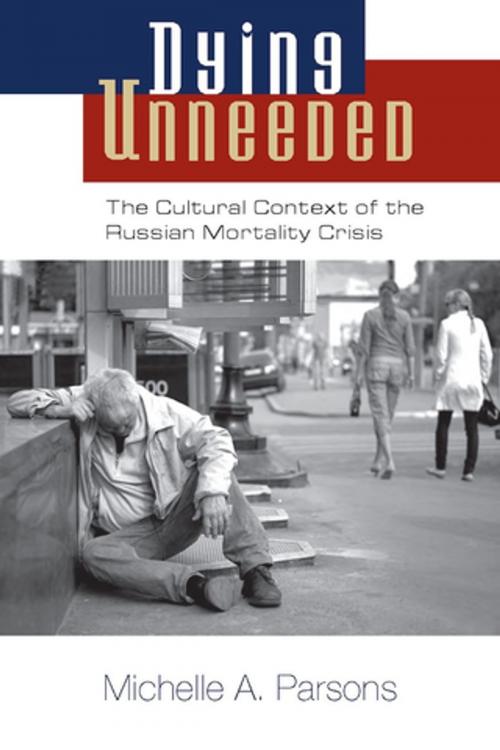Dying Unneeded
The Cultural Context of the Russian Mortality Crisis
Nonfiction, Social & Cultural Studies, Social Science, Gender Studies, Gay Studies| Author: | Michelle Parsons | ISBN: | 9780826519740 |
| Publisher: | Vanderbilt University Press | Publication: | June 12, 2014 |
| Imprint: | Vanderbilt University Press | Language: | English |
| Author: | Michelle Parsons |
| ISBN: | 9780826519740 |
| Publisher: | Vanderbilt University Press |
| Publication: | June 12, 2014 |
| Imprint: | Vanderbilt University Press |
| Language: | English |
In the early 1990s, Russia experienced one of the most extreme increases in mortality in modern history. Men's life expectancy dropped by six years; women's life expectancy dropped by three. Middle-aged men living in Moscow were particularly at risk of dying early deaths. While the early 1990s represent the apex of mortality, the crisis continues. Drawing on fieldwork in the capital city during 2006 and 2007, this account brings ethnography to bear on a topic that has until recently been the province of epidemiology and demography.
Middle-aged Muscovites talk about being unneeded (ne nuzhny), or having little to give others. Considering this concept of "being unneeded" reveals how political economic transformation undermined the logic of social relations whereby individuals used their position within the Soviet state to give things to other people. Being unneeded is also gendered--while women are still needed by their families, men are often unneeded by state or family. Western literature on the mortality crisis focuses on a lack of social capital, often assuming that what individuals receive is most important, but being needed is more about what individuals give. Social connections--and their influence on health--are culturally specific.
In Soviet times, needed people helped friends and acquaintances push against the limits of the state, crafting a sense of space and freedom. When the state collapsed, this sense of bounded freedom was compromised, and another freedom became deadly.
This book is a recipient of the annual Norman L. and Roselea J. Goldberg Prize for the best project in the area of medicine.
In the early 1990s, Russia experienced one of the most extreme increases in mortality in modern history. Men's life expectancy dropped by six years; women's life expectancy dropped by three. Middle-aged men living in Moscow were particularly at risk of dying early deaths. While the early 1990s represent the apex of mortality, the crisis continues. Drawing on fieldwork in the capital city during 2006 and 2007, this account brings ethnography to bear on a topic that has until recently been the province of epidemiology and demography.
Middle-aged Muscovites talk about being unneeded (ne nuzhny), or having little to give others. Considering this concept of "being unneeded" reveals how political economic transformation undermined the logic of social relations whereby individuals used their position within the Soviet state to give things to other people. Being unneeded is also gendered--while women are still needed by their families, men are often unneeded by state or family. Western literature on the mortality crisis focuses on a lack of social capital, often assuming that what individuals receive is most important, but being needed is more about what individuals give. Social connections--and their influence on health--are culturally specific.
In Soviet times, needed people helped friends and acquaintances push against the limits of the state, crafting a sense of space and freedom. When the state collapsed, this sense of bounded freedom was compromised, and another freedom became deadly.
This book is a recipient of the annual Norman L. and Roselea J. Goldberg Prize for the best project in the area of medicine.















